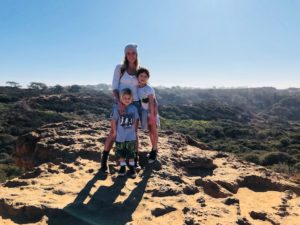Meet Jenny Palmiotto!
Jenny is the founder and visionary behind the Family Guidance and Therapy Center. Not only is she passionate in her work with children, she is also passionate in her advocacy for the individual rights of autistic individuals, which led her to start the annual Love & Autism conference in San Diego. Jenny's belief that being your authentic self in this world, even in her professional life, has created a clinical practice that is honest, open and allows each client to feel a sense of belonging in this word. At the Family Guidance and Therapy Center of Southern California, each team member works from a set of personal values that drive client care. In the interview below, learn why Jenny decided to become a clinician, the values that she brings to the FGTC team, and what challenges her on a personal level.
I find so much joy in seeing little people grow up and do meaningful things like read their first chapter book, share a first kiss with a girlfriend, graduating from college. I get to walk alongside people as they walk through life. For me, this is soul filling work.
Tell us a little bit about yourself.
Here are 10 things you probably didn't know about me:
- I'm a compulsive reader of autistic authors.
- I am overly competitive when I play any sort of board game or actual game. I like to make a contest out of anything like who can kick their leg the highest. Fun, dumb contests always make me laugh.
- I am waiting for the scientific findings that sunbathing is really good for me.
- I think sibling love is one of the most beautiful loves that we have on this earth.
- I still have deep wounds and insecurities from growing up with dyslexia. It seems that no amount of information or feedback that I'm smart will erase feeling "stupid" during my early years.
- My cell phone is almost always cracked.
- I have 15 nieces and nephews.
- My besty and I have weird nicknames that come in pairs: Hester and Ester, Bama and Rooster. For whatever reason these names are always interchangeable meaning the first person to speak always has the first name. It's weird and we've been doing it for twenty years.
- I have always hated exercise.
- I'm in a really good place right now and that feels great.
What inspired you to work as a therapist?
This a 2-part story. First, my mother tells me that I have said I want to be a child psychologist since I was three years old. Weird. We think it must have been on some sort of sitcom. Second part: I fell into autism because of love or at least a crush. I had a thing for this kinda nerdy guy, Bill Herman the III. He told me that he got a new job at a group home. I wanted to work with him, so I applied to work there too. He decided not to take the job, but I found myself finding a real love in my work with autistic people. If you are wondering about what happened with Bill...well it wasn't quite a traditional love story, but it sure was a great friendship. In some ways, this is my first Love & Autism experience...I just didn't know it yet.
Explain your personal value words and why they are important to you.
Belonging, authenticity, and growth are my core values. I've added adventure as a 2018 focus. As a mom and business owner, I lost a little bit of my adventure side to the day to day activities that often define these roles. When I recognized that I was missing this in my life, I was quick to consider why I wanted adventure to show up in my life....was I using adventure as escape? Was it me just being nostalgic for my twenties? No, it is a core of who I am. So, with this I set off to create adventure. I've found myself in rural Texas on a ranch. As a family, we set to Nicaragua in March. I can't wait to see what focusing on adventure brings to my life this year.
What is unique about your work with clients?
In all honesty, it’s a combination of not taking my job too seriously and taking it very seriously at the same time. My clients and I often find ourselves in fits of giggles during therapy sessions all the time. Yet, I also know that because I've chosen to work with children, I am part of growing human beings. I go all in on these kids’ lives. I find so much joy in seeing little people grow up and do meaningful things like read their first chapter book, share a first kiss with a girlfriend, graduating from college. I get to walk alongside people as they walk through life. For me, this is soul filling work.
What’s the most challenging and rewarding part of your work?
The most challenging part of my job is the awareness that global change related to re-humanization of autistic individual is LIFE work. I may very much leave this world before there is substantive changes to the negative discourse and subsequent treatment for autistic people. On the best of days, this drives my passion for change and fuels Love & Autism. On the harder days, this brings me to tears and I almost feel like giving up. But on most days, my heart is full. I know my colleagues and I push so much good into the world, and that feels good.
After a long work week, how do you de-stress or unwind?
It's simple: Order UberEats (I don't cook at all), have a glass of wine and do something silly with my children. From having dance parties to building indoor skate ramps...we live from a place of "Yes." I love the creativity and confidence of being around my five and seven year old.
Tell us a funny story about yourself!
When I was young, I thought I might want to be a sister within the Catholic church. In fourth grade, I was inspired by the kindness, compassion, and service of my teacher Sister Noreen. Yet, I was torn between that and the desire to be a mother. At the age of ten, this created a bit of worry that I shared with my parents and sister. Yet, I trusted that if God called me, I would adhere. At that point, my literal brain thought that this calling was an actual telephone call. My father, a practical joker, decided to place this call to me. I discovered that that I wasn't getting a call from God, the father...just my dad and sister calling from the other room.... who found it wildly funny. So, I didn't a call from God that day but when I was old enough, I did the exact same prank to my younger brother. I guess you can say I still love a good practical joke. This is one of the things I enjoy doing when I work with autistic teens....exploring the sense of fun and silliness through pranks.
We will be releasing our therapist spotlights once a month on our blog and Facebook page. Go here to read more or follow us on Facebook!

